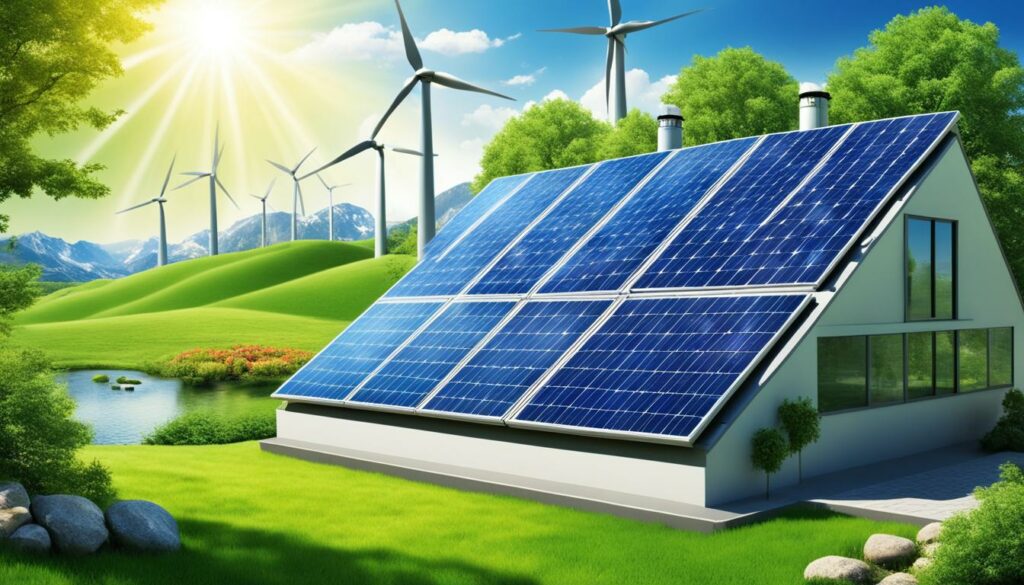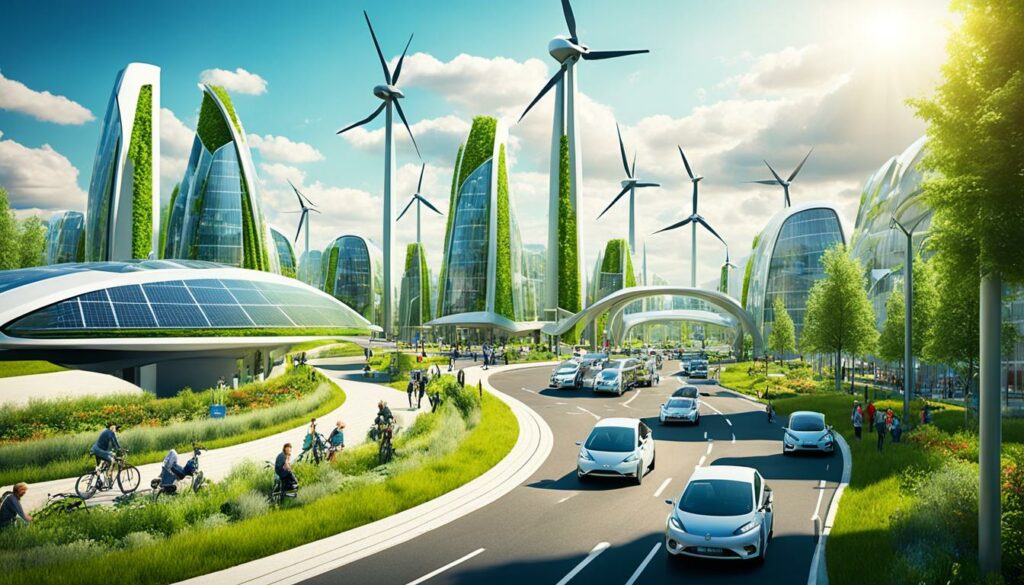Sustainable Energy Transition: Opportunities & Strategies
The National Platform for the City of the Future is committed to the city of the future. The goal is to start an energy transition. The aim is to reduce the use of fossil fuels such as oil, gas and coal. These substances are the main cause of harmful greenhouse gases.
The government is funding projects for our energy future. The Federal Ministry of Education and Research is researching new technologies. This is intended to protect the environment and strengthen the economy. This is a big step towards becoming less dependent on dangerous fossil fuels.
Key Takeaways
- The German government is promoting programmes for sustainable energy supply.
- The aim is to reduce fossil fuels such as oil, natural gas and coal.
- Renewable energies and new technologies are the focus of research.
- The energy transition aims to reconcile people and the environment.
- A "green economy" combines economic, ecological and social aspects.
Opportunities for a sustainable energy transition
German companies are world leaders in the sustainable energy transition. Especially in emerging countries, they find many opportunities. There, many are looking for green technologies from Germany.

Improving energy efficiency
The government promotes programs that promote a greener energy supply. They want to use less oil, gas and coal, be more environmentally friendly and use energy better. This benefits nature and the economy.
Promotion of renewable energies
The Federal Ministry invests in research into renewable energies. This is giving rise to new key technologies and innovative ideas in Germany. These support environmental projects and create jobs in poorer countries.
| Region | Power supply | Potential renewable energies |
|---|---|---|
| Africa | 70% fossil | 1,000x Power Requirement 2040 |
| Latin America | Mainly fossil sources | High solar radiation, wind capacities |
The demand for clean energy in such areas is growing. German manufacturers are very well respected and find good opportunities there. They sell technology for remote villages and invest in solar energy.
This promotion of green electricity not only helps the local towns. It also drives research and business in Germany.
In the future, Germany wants to invest more than 100 billion euros in the global energy transition. This helps to bring environmentally friendly technologies to many countries. It strengthens the global energy industry and makes it more modern.
Strategies for the implementation of renewable energies
In Germany, there are many strategies for implementing renewable energies. They are driven by politics and technology. Energy policy is particularly important. It sets clear rules and promotes innovation.

Political framework
A good energy policy helps to use renewables correctly and protects the environment. Between 2000 and 2017, renewables in the electricity mix rose from 6.5% to 36.4%. This is the result of smart political decisions that invest and promote new ideas.
Technology development and innovation
Technologies and new ideas improve how we use energy and use renewable sources. From 2010 to 2016, Germany made more energy benefits per unit from final energy every year. The future presents us with new challenges. That's why we are increasingly focusing on new technologies and ideas. This also includes using more solar power than wind power by 2050 and developing synthetic fuels.
Here are some planned figures up to 2050:
| Year | Share of renewable energies in gross electricity consumption | Import of electricity and synthetic energy sources | Behavioral and lifestyle changes |
|---|---|---|---|
| 2017 | 36,4% | 5 TWh | First scenario |
| 2030 | 50% (forecast) | 15 TWh (forecast) | Second scenario |
| 2050 | 80% (forecast) | 30 TWh (forecast) | Third scenario |
What is needed is cooperation between politics, business and society. This is how energy policy can succeed. Only then will we protect the environment and shape an energy-saving future.
Challenges and opportunities of the sustainable energy transition
The global energy transition is a major task. But it also brings many possibilities. Particularly important are the protection of the environment and the use of green technologies.
A switch to renewable energies must ensure the supply of energy. Germany is already one of the top producers of wind energy. It has invested a lot in renewable energy.
According to the Federal Environment Ministry, at least 65% of electricity is to come from renewable sources by 2030. This requires new technologies and collaboration across borders.
Implementation challenges
The step towards sustainable energy has its hurdles. These include changes in consumer behavior. The switch to CO2-free energy and the use of CCS technologies in factories are also important.
New energy sources must fit into our infrastructure. But the changeover also creates new jobs. For example, in the planning and maintenance of green technologies.
International cooperation
In order to achieve the energy transition, we must work together across national borders. Projects such as hydrogen alliances offer opportunities to discover new markets. They are also important for spreading green technologies worldwide.
The transition to new energies has become an important topic worldwide. It brings with it many technical and ecological challenges, but also opportunities. It is crucial to research new technological developments in detail. This will help us understand how they affect the environment.
Result
The energy transition is urgently needed to secure the future of Germany and worldwide. Political rules, new techniques and cooperation are very important. Projects with wind, water and sun are already doing better. They help to protect the environment.
It also helps if we use less energy and travel in an environmentally friendly way. It's important to invest in new technologies and prepare people for new jobs. Austria is striving to make no more greenhouse gases by 2040. This helps to make electricity cheaper as more clean energy is used.
The International Energy Agency says that a particularly large amount of clean energy will be generated in 2023. This trend is likely to continue until 2024. Nevertheless, many people in the world do not have access to electricity. Africa and other places could become important places for clean energy.
Many see that the energy transition is difficult, but brings many good things. Politicians, companies and researchers must work together. This is the only way we can create a world where energy is safe and good for everyone.